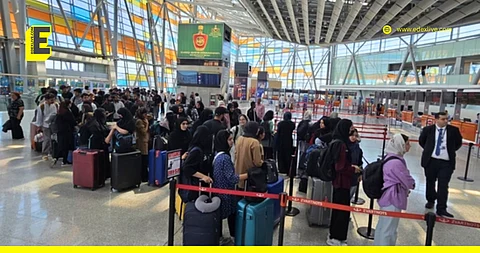

As missiles rain over Tehran and the Middle East teeters on the brink, India has launched a high-stakes evacuation mission to bring its nationals home from Iran.
Operation Sindhu, announced by the Ministry of External Affairs (MEA) today, June 18, marks India’s swift diplomatic and logistical response to the escalating conflict between Iran and Israel that has already claimed hundreds of civilian lives and devastated critical infrastructure across the region.
The inaugural phase of Operation Sindhu achieved a significant milestone with the successful extraction of 110 Indian nationals, predominantly medical students from Kashmir pursuing their studies at Urmia University, who were safely escorted across the Iranian-Armenian border on June 17. A special flight carrying them from Yerevan departed at 2.55 pm local time and is scheduled to land in New Delhi in the early hours of June 19.
Simultaneously, Indian students enrolled at institutions such as Tehran University and Shahid Beheshti University were relocated from the capital to relatively safer cities like Qom, as part of a coordinated effort by the Indian Embassy and university authorities to safeguard nationals ahead of wider evacuation efforts.
With the groundwork in place, the second phase of Operation Sindhu is now underway, focusing on relocating the remaining Indian nationals still in Tehran to Armenia by land. Once safely across the border, they will be airlifted to India in subsequent evacuation flights.
The Embassy of India in Tehran continues to maintain round-the-clock communication channels with the Indian community, coordinating closely with local authorities and institutions to ensure a safe and organised exit amid rapidly worsening conditions.
The Government of India has expressed gratitude to the Governments of Iran and Armenia for their cooperation and the smooth facilitation of the evacuation process, which has been crucial in ensuring the safe transit of Indian citizens through an active conflict zone.
Dr Mohammad Momin Khan, State Vice-President of the All-India Medical Students' Association (AIMSA), expressed deep appreciation for the prompt and coordinated response of the Indian Embassy in Iran amid the unfolding crisis. He commended the embassy’s proactive efforts in relocating students from high-risk areas to safer zones and highlighted the crucial role of collaboration between AIMSA and the Jammu and Kashmir Students Association (JKSA) in streamlining communication and ensuring no student was left behind.
“The situation demanded swift, collective action, and I’m grateful that all stakeholders, including the Embassy, AIMSA, and JKSA, rose to the occasion,” Dr Khan said.
The evacuation unfolds against an increasingly catastrophic regional backdrop, with the Iran-Israel confrontation having entered its sixth consecutive day of intensive aerial warfare.
Israeli Defense Forces have deployed more than 50 advanced fighter aircraft in sustained bombardment campaigns targeting Iran's nuclear infrastructure and strategic missile installations.
Tehran has responded with overwhelming force, launching over 400 unmanned aerial vehicles and ballistic missiles toward Israeli territory, creating an unprecedented cycle of retaliation that has already resulted in hundreds of civilian casualties and widespread infrastructure devastation.
The geopolitical implications have been further complicated by President Donald Trump's inflammatory public statements demanding Iran's unconditional capitulation while threatening potential American military intervention. These pronouncements have elicited sharp diplomatic rebukes from Tehran and heightened concerns among international observers regarding the conflict's potential for broader regional destabilisation.
As Operation Sindhu progresses, India's foreign policy apparatus faces the dual challenge of maintaining strict neutrality in the bilateral dispute while ensuring the unimpeded evacuation of its citizens.
The government's immediate priority remains the comprehensive evacuation of all Indian nationals from high-risk zones, with officials expressing cautious optimism regarding the mission's ultimate success despite the deteriorating security environment across the region.
